#andrei tarkovsky: interviews
Explore tagged Tumblr posts
Text
youtube
Interview with the cinema icon Andrei Tarkovsky with English subtitles.
#andrei tarkovsky#tarkovsky#cinema history#history#cinema#cinephile#film#movie#pelicula#cinemetography#cinestill#interview#life#philosophy#thoughts#quotes#life quotes#film director#cinematic#Youtube
0 notes
Text



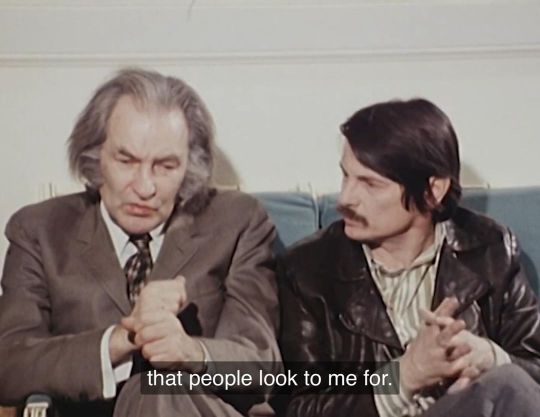



Andrei Tarkovsky in an Interview about Mirror, 1975
75 notes
·
View notes
Text
"My objective is to create my own world and these images which we create mean nothing more than the images which they are. We have forgotten how to relate emotionally to art: we treat it like editors, searching in it for that which the artist has supposedly hidden. It is actually much simpler than that, otherwise art would have no meaning. You have to be a child —incidentally children understand my pictures very well, and I haven’t met a serious critic who could stand knee-high to those children. We think that art demands special knowledge; we demand some higher meaning from an author, but the work must act directly on our hearts or it has no meaning at all. I wouldn't like to describe my pictures as allegorical: they talk about things that disturb me. If my account is allegorical, that is not my intention -there is no ulterior motive to reveal a hidden meaning.” ― Andrei Tarkovsky, "Interviews"
139 notes
·
View notes
Text

















paranoid - hippo campus / henry peglar's wallet and pages / mirage 1 - ana mendieta / mirror - rita dove / meshes of the afternoon (1943) - maya deren / knife as a mirror (1975) - peter weibel / the mirror (1975) - andrei tarkovsky /national geographic - interview with jonathan lamb / ways of seeing - john berger
64 notes
·
View notes
Text
Nobody knows what beauty is. But when a human being, finds himself close to this beauty, encounters this beauty, he feels its presence, at least through the goosebumps that run down his back. Beauty is like a miracle that a person involuntarily witnesses. That's the whole point.
From the last interview with Andrei Tarkovsky (October 1986)

60 notes
·
View notes
Text
“Nobody knows what beauty is. But when a human being, finds himself close to this beauty, encounters this beauty, he feels its presence, at least through the goosebumps that run down his back. Beauty is like a miracle that a person involuntarily witnesses. That’s the whole point.”
— From the last interview with Andrej Tarkovskij, October 1986
In 1977, the Italian director Michelangelo Antonioni gifted Andrej Tarkovskij a Polaroid camera. These snapshots, framed like a cinematographer’s eye and staged with painterly elegance, capture Tarkovskij’s aesthetic essence beyond mere documentation. These portable glimpses of memory etched onto Polaroid’s surface infuse the past with a sense of life and depth, creating an ethereal and sublime quality through their slightly overexposed light.
Tarkovskij’s deliberate films delve into themes of memory, childhood, and dreams, opposing Hollywood’s quick-cut editing craze.
He mastered time and rhythm, considering it “the dominant factor of the film image.”
Polaroids’ Credits ↓
Andrej Tarkovskij from the book Instant Light: Tarkovskij Polaroids from Thames and Hudson
Andrei Tarkovsky, “Directed by Andrei Tarkovsky”, 1988
#art #arte #cinema #photooftheday #photography #AndreiTarkovsky #polaroid
15 notes
·
View notes
Text





The Sacrifice (1986) dir. Andrei Tarkovsky - Voyage to Cythera (1984) dir. Theo Angelopoulos // "What do our souls seek?": an interview with Theo Angelopoulos, Andrew Horton (1995) // Nostalghia (1983) dir. Andrei Tarkovsky - Landscape in the Mist (1988) dir. Theo Angelopoulos
#andrei tarkovsky#theo angelopoulos#theodoros angelopoulos#cinema#web weaving#voyage to cythera#nostalghia#the sacrifice
41 notes
·
View notes
Quote
An image cannot be a symbol in my opinion. Whenever an image is turned into a symbol, the thought becomes walled in so to speak, it can be fully deciphered. That's not what image is. A symbol is not yet an image. Although image cannot be explained, it expresses truth to the end... Its meaning remains unknown. I was asked once what the bird on boy's head in The Mirror meant. But any time I attempt to explain, I notice everything loses its meaning, it acquires a completely different sense than intended, moves away from its rightful place. I could only say a bird would not come to an evil man but that's not good enough. A true image is an abstraction, it cannot be explained, it only transmits truth and one can only comprehend it in one's own heart. Because of that it's impossible to analyse a work of art by utilising its intellectual significance.
Interview with Andrei Tarkovsky (Taiteen on jalostettava katsojia with Risto Mäenpää and Jaakko Pyhälä in "Filmihullu" 1976 (8), pp. 7–11)
44 notes
·
View notes
Text
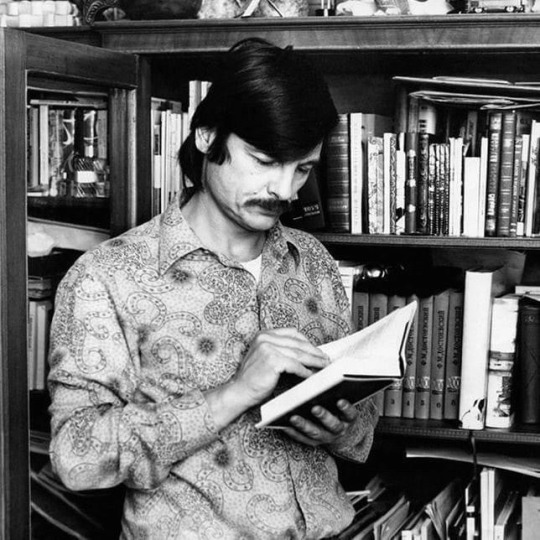
WHAT TARKOVSKY READ, PART 1: FOREIGN LITERATURE
Quotes about favorite and least favorite foreign authors and works by Andrei Tarkovsky from his diaries, interviews and speeches.
📚 I am rereading T. Mann. Genius writer. Death in Venice is amazing. This is with a ridiculous plot. (Martyrology. August 15, 1970).
📚 Read Vonnegut's The Children's Crusade. Yes. He is both a pacifist and a good fellow. Likho writes. But where, where is our Russian senseless and useless great depth?! Sad. (Martyrology. September 1, 1970).
📚 We must finally find out if Camus' "The Plague" was filmed. If not, then it would be worth talking to O. Teinishvili. Let him offer Gambarov two things: "The Plague" and a script about Dostoevsky, which we were going to write with Misharin. Solonitsyn could be a wonderful Dostoevsky. (Martyrology. September 7, 1970).
📚 I read Vonnegut's "Cat's Cradle". Dark book. And smartly written. Still, pessimism has too little to do with art. Literature, like art in general, is religious. In its highest manifestation, it gives strength, inspires hope in the face of the modern world - monstrously cruel and, in its senselessness, reached the point of absurdity. Modern real art needs catharsis, with which it would cleanse people before the coming catastrophes, and maybe a catastrophe. (Martyrology. September 9, 1970).
📚 I read Akutagawa's story about water kappas. Pretty bad. Sluggishly. (Martyrology. September 18, 1970).
📚 I'm reading The Bead Game - a brilliant book! ... A super-art built on universalism, on the experience of all knowledge and discoveries. Spiritual symbol of life. Brilliantly conceived novel! Haven't read anything like this in a long time. (Martyrology. September 20, 1970).
📚 I finished reading "The Glass Bead Game". Amazing impression. (Martyrology. September 26, 1970).
📚 I am reading the amazing Thomas Mann - "Joseph and his brothers". Some otherworldly book. Otherworldly kitchen gossip. It becomes clear why the typist, having finished rewriting "Joseph", said: "Now at least I know how it really was." Yes ... and as for the film adaptation, I just don’t know what to say. So far, in my opinion, it is inexpressible. (Martyrology. September 15, 1970).
📚 About "Solaris": "... it attracted me first of all not by the fantastic nature of the events told, not by the amazing unexpectedness of the world composed by the author. What struck me was the author's realism in developing a situation that was fundamentally possible, the accuracy of psychological motivations in the behavior of the characters who fell into this situation ... ”(From an interview with O. Evgenyeva, 1971).
📚 I carry an unbearable burden on my shoulders. Mannovsky's "Doctor Faustus" is the most complex conglomeration of the life lived by the author, his lost hopes lost in his lost homeland, thoughts about suffering, the painful suffering of the artist, about his sinfulness. On the one hand, he (the artist) is an ordinary person, on the other hand, he cannot be ordinary, therefore, he pays for his talent with his soul. (Martyrology. December 5, 1973).
I have read Peer Gynt by Ibsen. Grandiose. (Martyrology. September 18, 1974).
📚 I am reading "Stiller" by M. Frisch. He is smart, he is too smart for a good writer, he is precise, economical, charming - a Japanese garden. He is very sweet and looks like his characters. This is also not a plus. I know him. He fed Larisa and me with dinner near Locarno. He was with a mistress whom everyone in Switzerland condemned for being his mistress. Dinner was delicious, the restaurant was wonderful, the tables were under oaks (or beeches?), and all those invited who condemned her talked to her sweetly and naturally, smiled at her. Good upbringing? Hypocrisy? Bigotry? Snobbery? And I liked him, a kind of puss in boots ... (Martyrology. July 4, 1975).
📚 I re-read the stories and Kafka's Metamorphosis. Somehow it doesn't work for me. (Martyrology. September 17, 1976).
📚 What a surprisingly clear relationship: Hoffmann - Hesse - Bulgakov. And what kind of children they are - pure, believing, suffering, not spoiled by glory, scrupulous, naive and passionate, noble ... "Golden Pot" - "Steppe Wolf" - "Master and Margarita". (Martyrology. April 14, 1976).
📚 I re-read Castaneda: "The Lessons of Don Juan". Wonderful book! And very truthful, because 1) the world is not at all the way it seems to us, and 2) it may well become different under certain conditions. (Martyrology. January 27, 1979).
📚 I read Lorca's amazing essays - amazingly passionate, sublime, deep and truly poetic insights. (Martyrology. June 6, 1980).
📚 "The Book of the World" ("Le livre de la paix") by Bernard Benson is some kind of delusional and stupid book. It is completely incomprehensible why it is: 1) popular and why 2) it needs to be filmed. I don't understand anything. Very strange. M. b., is this a provocation of the ideas of the struggle for peace? It's possible. That is what I talked about with Bibi A[derson] in Stockholm. (Martyrology. June 10, 1981).
📚 Since childhood, I have been very fond of the book "Robinson Crusoe" - I always liked it terribly and excited the enumeration of what was thrown ashore and what was Crusoe's prey. We live materialized, repeating the existence of space and time. That is, we live thanks to the presence of this phenomenon or two phenomena and are very sensitive to them, because they limit our physical limits. (A word about the Apocalypse).
📚 "Hamlet" is the best dramatic and poetic work that only exists in the world. (From a meeting with the audience in London, 1984).
📚 A romantic would try to invent this aura, because he guesses that it should be. But the poet sees it. You can say that there were poets among the Romantics as well. Of course, I do not argue. There was Hoffmann, whom I simply adore. (From a conversation with Jerzy Illg and Leonhard Neuger, March 26, 1985).
📚 I have great respect for Stanislav Lem, I love his works, and when I can, I read them. … He was interested in the collision of man with the cosmos, with the Unknown, but I was interested in an internal, spiritual problem. I picked up this novel only because for the first time I saw a work that I could define as a story of repentance. What is repentance, repentance in the literal, classical sense of the word? When for us our memory of committed misconduct, of sins becomes a reality. For me, Lem's novel was a reason to make such a picture. (From a conversation with Jerzy Illg and Leonhard Neuger, March 26, 1985).
📚 I read Flaubert's "St. Anthony": headily, secondarily (after the primary sources), illustratively and very magnificently. Serezha Parajanov would have made a wonderful adaptation of this. (Martyrology. March 26, 1986).
📘 Separately, it is worth noting that in the 1974 questionnaire, Andrei Tarkovsky answered “Doctor Faustus” in the column about his favorite foreign prose or novel, and Thomas Mann “Tonio Kroeger” in the column about a foreign novel; Maupassant.
6 notes
·
View notes
Text

This was a realization that made my spirit pause. The problem was not that I still kept wishing for her to fill in story gaps, driven by swells of curiosity and impatience and some notion that a finished story would organize my feelings and settle me. I did not know how to tune into the quieter melody of my mother; how to listen beyond what was plainly "said" for the underthings.
The filmmaker Hayao Miyazaki would call this quieter melody "ma." In Japanese, ma is the word for pause, interval or even emptiness. There is no direct translation, but the kanji characters that form the word show a sun peeking out in the space between two gates.
In an interview with Roger Ebert, Miyazaki once illustrated the concept to Ebert by clapping. "The time in between my clapping is ma. If you just have non-stop action with no breathing space at all, it's just busyness. But if you take a moment, then the tension building in the film can grow into a wider dimension." According to Miyazaki, American movies with their frantic pace and obsession with plot are often afraid of that silence, that ma. Yet life is filled with empty spaces and details that aren't directly "useful" to the story but have their own emotional brio. That is what Miyazaki is always telling us with the lulls and quiet moments in his films. Two characters riding a train in still- ness, silently watching a landscape at sunset or observing the slow performance of a spinning leaf remind us that dialogue is not the only way people talk.
I have always loved how Hayao Miyazaki does rain. How Terrence Malick does grass and Andrei Tarkovsky does wind. I love the lovingness toward the long image and the plotless moments when ground overtakes figure and, zooming out, we're suddenly allowed to see human drama in its proper proportions. Instead of every moment being dictated by the human story, this sealing up of the overlooked is a great reminder that we are, in fact, minuscule in the cosmic scheme of things, just one part and particle of a larger picture.
There is no real proxy to the moving, mute camera in written text. Silence must be declared through words that sometimes sit on the page with too much presence. Silence proclaims itself as "thick," "fleeting," "heavy" or "noisy." It is not the sinuous and indeterminate silence of film; a silence that can be subliminal and suggestive rather than stated. To appreciate filmic silence, imagine the nervous clatter of dishes or other quiet incidental sounds taking place outside a room while a family sits down for an awkward meal. Feel the emotional pressure and renderings that carry into wordless, unvocalized space.
Whether we call this a quieter melody or ma, it is powerful to feel the presence of what is not openly declared, what lies beyond persona's grip, the promise and possibilities on the outskirts of any story. If the gap, particularly the gap between self and other, is intrinsic to the story, it is possible something is lost when we fill it with supposition, chatter, conjecture, even artistic flourish. But what is it? What is lost when we dissolve a gap for the sake of smooth tale-telling?
Ma is frequently equated with "negative space." I have also seen it described nicely by Jerrold McGrath as a "free zone that allows for dissimilar things to co-exist." Likewise, it can refer to the distance between two fighters. In karate, knowing the safe or suitable distance ("ai") between oneself and an opponent based on their reach is considered "understanding ma-ai."
One weekend, I sat with ma and did not ask a single question. I did not try to tug up my mother's memories by their pointed tips or forage her life. My mother and I watched several Miyazaki films together. Her favorite was My Neighbor Totoro. Maybe it was the way Miyazaki stopped to take in the view or how he made a character of trees, sky, insects, water. Maybe it was how he pointed to the ghosts living easily within daily life. Or maybe it was just all the flowers.
—Unearthing: A Story of Tangled Love and Family Secrets, Kyo Maclear
0 notes
Text
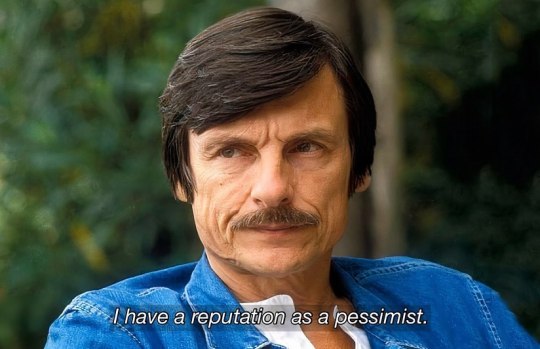
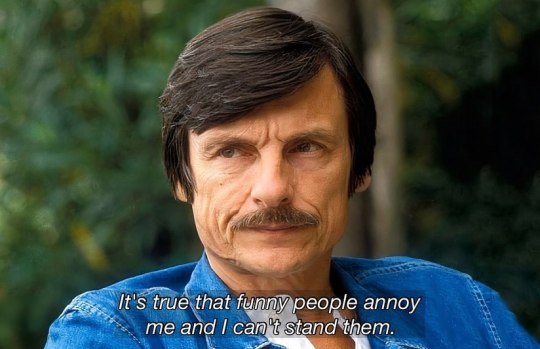
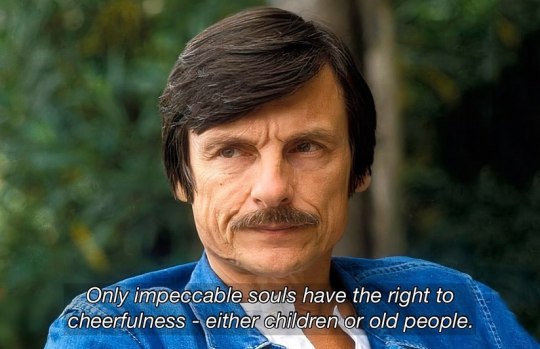
Andrei Tarkovsky in a Interview with Herve Guibert. Rome, 1983
102 notes
·
View notes
Text

mood drawing for sound design
Inspiration
Ohzora Kimishima:
Kimishima is one of my favourite musicians/guitarists. I also love the collaboration he does with other artists to create a visual language/aesthetic world through his music videos and stages.
He has roots in many different art medias, he has stated in interviews that he takes great inspiration from Andrei Tarkovsky or collage artists like Toshiko Okanoue, artist Man Ray, and many other artists/poets/film producers from around the world.
Halo https://www.youtube.com/watch?v=QfA1taW5P5s
This whole music video is taken in one go. The original song is also using most of the demo tape that he randomly started playing by a beach which somehow turned into a song(he says). I love how organic this one is.
0 notes
Text
youtube
Donatella Baglivo interviews Andrei Tarkovsky in A Poet In the Cinema (1983).
1 note
·
View note
Text
I have a reputation as a pessimist. It's true that funny people annoy me and I can't stand them. Only impeccable souls have the right to cheerfulness - either children or old people.
Andrei Tarkovsky. Interview with Herve Guibert. Rome, 1983
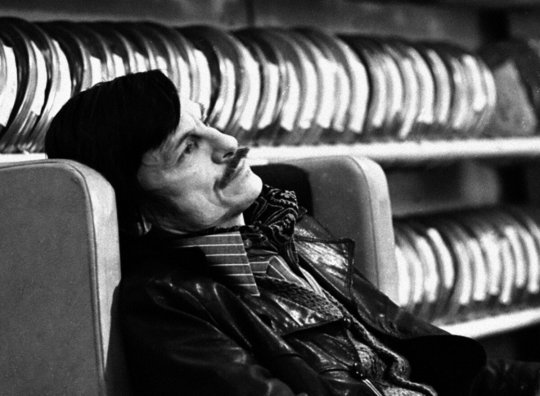
13 notes
·
View notes
Text
youtube
Amazing 2 hour interview with Andrei Tarkovsky Jr. and Fr. Vladimir breaking down the details and symbology of the film
0 notes
